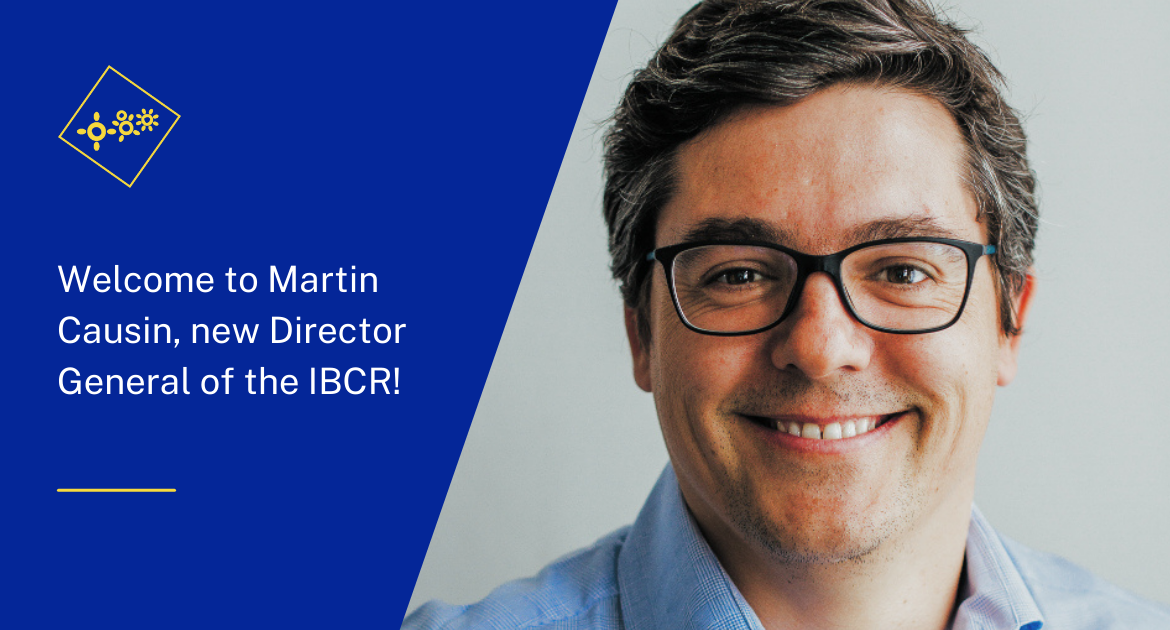
2022 heralds a new chapter for the International Bureau for Children’s Rights (IBCR), which welcomes a new Director General. Martin Causin, formerly Project Manager in Burkina Faso, then regional representative for Africa for the IBCR since 2020, has taken up this challenge since January. He takes over from Guillaume Landry, who was called to new horizons after working for the IBCR for more than 15 years. Learn more about his background and vision in this short interview.
Interviewed in January 2022.

Martin Causin holds a Master’s degree from the Catholic University of Leuven in Belgium and has spent his entire career in programme leadership and management. He spent seven years in Burkina Faso as a country representative for ADJAO, where his commitment to children’s rights took root, particularly in his work to facilitate access to sport and recreation for the most disadvantaged youth.
Martin joined the IBCR in 2017 with the desire to contribute to the development of child protection systems that are responsive and respectful of their rights. After four years as a project manager in Burkina Faso, he became IBCR’s regional representative in Africa. This last position, focused on project development and coordination of our actions in Africa, was a stepping stone to the general management of the Office, a position occupied by Martin Causin since January 2022.
From the beginning of your career, you have worked on projects to improve access to justice for women and children, as well as on education projects. Where did your interest and sensitivity for children’s rights come from?
Martin Causin (M.C.) : Before I developed a sensitivity for human and children’s rights, I first had an attraction for the African continent. In the middle of high school, I had the chance to go to Burkina Faso for an exchange trip, which was the starting point of my engagement. I was significantly impacted by the relationships I had the chance to build there, and I developed a strong interest in a number of development issues. As a lawyer by training, I was very quickly drawn to issues related to education and human rights. At the beginning of my career, I quickly focused on these aspects, and with more than 50% of the African population under the age of 18, issues related to children’s rights automatically became an important part of my work.
You have recently been appointed Director General of the IBCR. How does this new professional challenge stimulate you?
M. C. : Life often works out well. When I joined the IBCR as a Project Manager, I did not imagine that a few years later I would be the Director General. It was when the project ended and when I took up my position as Regional Representative for Africa that my interests gradually turned to more strategic aspects. These two positions gave me the opportunity to face both the challenges of field activities and the issues of coordination and development of the Organisation’s activities. What also pushed me to get involved in this new challenge is that I fundamentally believe in the results targeted by our projects at the IBCR, especially because I had the opportunity to really see them in the field, notably in Burkina Faso, the Democratic Republic of Congo, Côte d’Ivoire and Tunisia. The fact that we do not deliver services to children ourselves, but accompany those who were in the field before us, who are in the field during our projects and who will still be in the field tomorrow to ensure that children’s rights are respected, is a philosophy that speaks to me and that I am proud to represent by taking this position. Structurally strengthening child protection systems by focusing on key competencies adapted to each actor and each context is an approach that I wish to pursue and develop.
As Director General, what are your directions for the Office’s priorities?
M. C. : My compass is the Bureau’s strategic plan. It reflects what we are already doing today, but also emphasises two pillars where we have room for improvement, namely listening to and involving children more as subjects of their rights and mobilising the actors of change. This means two things; firstly, raising ourselves to the level of children and equipping them to be responsible and active in their own protection and in the concrete ways in which they can do so. Secondly, it also means building the capacity of a wider range of actors in the child protection system so that on the one hand, they can better fulfil their child protection role, but also, on the other hand, that they integrate into their practices the fact that children are precisely actors in this protection system just as they are. I think that this is what we need to focus on. Finally, I would also like to improve the analysis of the impact of our action with children in the different countries in which we have intervened.
In your opinion, in the coming years, what are the main issues that will impact on children’s rights around the world?
M. C. : In many of the contexts in which we work, particularly in the South, demographics are on the rise and half the population is often under 18, which means that more children are likely to find themselves in situations where their rights are violated. To address this, protection systems need to continually adapt and strengthen, and the actors within them need to be adequately trained and equipped to protect and support these children, both facing this increase and the new forms that these violations may take. There is also an increase in certain violations of children’s rights linked to specific geographical contexts, such as population displacements or emergency situations – whether climatic, humanitarian or security-related. These unstable situations reveal a major challenge: ensuring that those responsible for protecting children on a daily basis have the necessary skills to adapt to these specific contexts. In addition, in Canada as elsewhere, the pandemic we are experiencing is having a considerable impact on children and their rights, increasing the risk of violence and exploitation, with less accessible protection services and greater isolation. The combination of these issues presents many challenges, which the IBCR will work to address in order to ensure that every child has better access to quality, rights-based protection services and can live and grow up in a safe and nurturing environment.
The arrival of a new leadership often means changes. What impetus do you want to give at the beginning of your mandate?
M. C.: First of all, I would like to thank Guillaume Landry for all the work he has done with and for the Bureau. I am taking over a healthy structure with good prospects for several years. There is a very positive dynamic in the way the IBCR aims to achieve its results, and my desire is first and foremost to lead it in an approach of continuity. Of course, I have set several priorities for the beginning of my mandate. Firstly, that of stabilising the implementation of our current projects, in a context of growth of the organisation and constant evolution of the situations experienced by the children. One of my priorities will therefore be to ensure that we retain our DNA as an office of technical expertise, while adapting to the world in which children live. Secondly, given the pandemic context, which has been impacting our activities for almost two years now, it is necessary to have a great capacity for operational adaptation – which the Bureau has already demonstrated – and to be creative about how to respond to the needs of our partners and, above all, of children. I therefore want to strengthen this capacity to adapt our approaches when necessary. Thirdly, I would like to see the IBCR’s work become even more committed to valuing and mobilising the lesser-regarded actors in the child protection system, so that they are better integrated and interact in a complementary way with the more traditional sectors of these systems. I am thinking of course of the children themselves, but also of civil society, the informal sector, the private sector, or even more specific state sectors. It is by placing at the heart of the system a greater number of sectors that are too often neglected and by creating strong connections between all of its components that children will see their rights better respected and will have access to adapted and quality services. Finally, I hope that the Bureau will be able to step up its work in Canada, in particular to support the implementation of the right to participation of the child, in order to strengthen his or her status as a subject of rights. This is illustrated by our project “Parole aux jeunes” (‘Voices of the youth’), launched in 2021 in Quebec, which gives a voice to adolescents so that they can influence prevention strategies and action against sexual exploitation.
Beyond these priorities, the goal for 2022 is to strengthen the Bureau’s commitment to finding innovative solutions, to rise to the level of children and to create a world in which every child enjoys rights equally and in all circumstances. Our PRIDE volunteer cooperation project is a good example of this commitment to innovation that is close to my heart, by putting collaboration at the heart of cooperation and creating an international network of exchanges and sharing of experiences that promotes new approaches and innovative solutions to advance the respect of children’s rights in Canada, Africa and Latin America.





